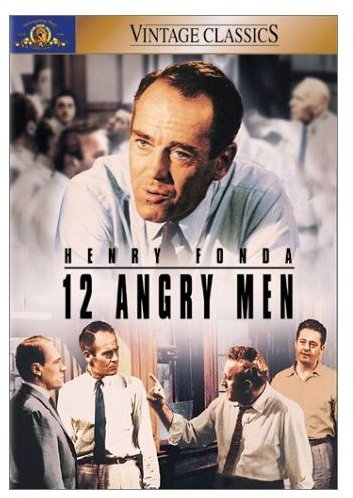"12 Angry Men" Characters & Plot Study Guide
“Twelve Angry Men” was originally written and broadcast in 1954 as a television play. In 1955 it was adapted for stage production, and then in 1957 was made into a highly successful film. It has been adapted and remade several times.
Plot Summary: A jury of 12 men must decide the fate of a teenage boy from the slums accused of murdering his father. The defendant, who already has a criminal record, will be sentenced with the death penalty if found guilty. Without spending any time discussing the evidence in the case, the jurors cast their votes. Eleven of the 12 men vote “guilty.” Only “Juror #8” votes “not guilty.” He struggles to persuade the others that they must put their personal prejudices aside, discuss the facts of the case, and determine if they have reasonable doubt about the guilt of the young man on trial.
Setting: The play takes place in a hot, stuffy jury room (there is no air-conditioning) in New York during the 1950s. The 12 men sit around a long conference table in straight-backed chairs in a room with only one window and a water cooler. The heat and the uncomfortable furnishings cause tempers to flare and patience to wear thin during the deliberation process.
Characters
The characters are referred to by their juror numbers only (except for the foreman).
The foreman “is a small petty man who is impressed with the authority he has;” he handles the deliberations in a formal manner.
Juror Two is “a meek, hesitant man” who can’t seem to form his own opinions.
Juror Three is an “extremely opinionated man” who seemingly derives pleasure from being cruel to others. He sees no point in discussing the case since it’s obvious to him that the defendant is guilty. He serves as the antagonist of Juror eight.
Juror Four is a “man of wealth and position” who has strong public speaking skills. “His only concern is with the facts in this case” and he strongly doubts the defendant’s alibi.
Juror Five is “a naïve, very frightened young man who takes his obligations in this case very seriously but who finds it difficult to speak up when his elders have the floor.” He admits to his fellow jurors that he has lived in a slum for most of his life.
Juror Six is not the most intelligent of the group and he spends much of his time listening to and contemplating the opinions of the other jurors.
Juror Seven is a stereotypical salesman whose main concern is reaching a verdict as soon as possible so that he’ll still have time to make a Broadway show for which he has tickets. “He is quick to show temper and equally quick to form opinions on things about which he knows nothing.”
Juror Eight is the protagonist; he takes his responsibility as juror very seriously. He tries his best to impress upon the others the need to base their verdict solely upon the evidence, without prejudice or sympathy.
Juror Nine is a retired, old man who has led an insignificant life and is merely “waiting to die.”
Juror Ten is “an angry, bitter man” who doesn’t hide the fact that he’s prejudiced against all people from the slums; he believes that all kids are liars, especially the defendant.
Juror Eleven is an immigrant from Europe who is grateful to be living in a democratic society after suffering through much injustice. He is responsible as a juror intent on seeking justice in an honest and honorable way.
Juror Twelve is an “advertising man” who understands business statistics better than he understands people. He constantly makes references to the world of advertising rather than express his opinions about the case.
For extra help while reading, keep track of the changes and opinions of each juror. Write down quotes that show whether the juror is being responsible or irresponsible behavior, and if the juror changes his opinion. The “Juror Tracking Sheet” can be used for this purpose.
References
- Image from Amazon.Com
